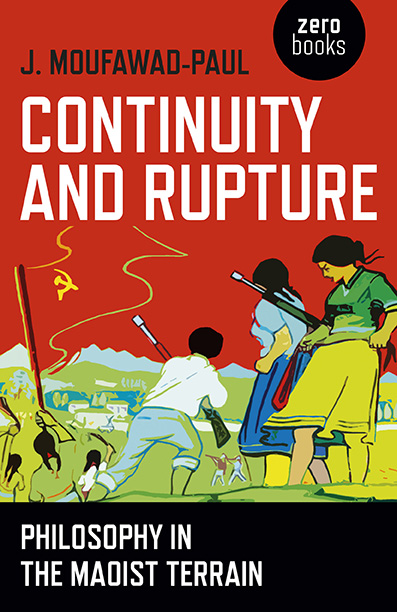Continuity and Rupture
A philosophical examination of the theoretical terrain of contemporary Maoism premised on the counter-intuitive assumption that Maoism did not emerge as a coherent theory until the end of the 1980s.

A philosophical examination of the theoretical terrain of contemporary Maoism premised on the counter-intuitive assumption that Maoism did not emerge as a coherent theory until the end of the 1980s.
A philosophical examination of the theoretical terrain of contemporary Maoism premised on the counter-intuitive assumption that Maoism did not emerge as a coherent theory until the end of the 1980s.
Communism, post-communism & socialism, History & theory, Political
A philosophical examination of the theoretical terrain of contemporary Maoism premised on the counter-intuitive assumption that Maoism did not emerge as a coherent theory until the end of the 1980s.
Click on the circles below to see more reviews
This is a fascinating must read and highly readable book; even if you disagree with the author's arguments, you will reconsider much of the rhetoric that we take for granted regarding Maoism. ~ Roxanne Dunbar-Ortiz, author of An Indigenous Peoples' History of the United States
Capitalism is headed for disaster. Any serious attempt to alter the course of history requires revolutionary theory. Whether you agree with Joshua Moufawad-Paul's conclusions or not, this book raises the questions we all need to ask. ~ Gabriel Kuhn, author of Playing as If the World Mattered
"Continuity and Rupture" is Moufawad-Paul’s theorization of a political and revolutionary thought of today. This book offers an active framework for understanding the Maoist turn in Marxism, which the author grounds in a challenging vision of history and a necessity for social change. ~ Julian Jason Haladyn, author of Boredom and Art
Moufawad-Paul's *Continuity And Rupture* is a much welcome attempt to bring philosophical clarity to political debates which all too often are wrapped around vague terms at the expense of conceptual clarity. Its central thesis claims that Maoism is a coherent theoretical development that both continues the revolutionary content of Leninist theory and breaks with its historical limitations, thus opening up a new set of theoretical possibilities ultimately rooted in the scientific propositions of historical materialism. It is a provocative thesis, but one that is lucidly explored by Moufawad-Paul. This is a book that should renew interest in historically concrete forms of Marxist theory and produce spirited, but invaluable debate, on the nature of Maoism. Highly recommended for both practical and philosophical reasons! ~ Esteve Morera, author of "Gramsci's Historicism" and "Gramsci, Materialism and Philosophy"
Calling all organizers, anti-capitalists, and people who care about anticolonial struggle—this book is for you. Beautifully clear, Moufawad-Paul lays out the concepts that we almost never get to learn in our schools or in our social movements—the concepts that many have struggled to grasp and apply—the concepts that are necessary for revolution. Placing the tools of western philosophy in the service of explicating the significance and necessity of actually-existing Maoism, this book is an accessible and compelling primer in science, theory, philosophy, and revolution. This book is just in time. At its heart, it is an historical materialist account of the unfolding of revolutionary praxis through the rupture and continuity of Marxist-Leninism and Marxism-Leninism-Maoism. Moufawad-Paul begins his periodization and clarification of Maoism from the revolutionary theory of the Community Party of Peru and the Communist Party (Maoist) of Afghanistan, situated in the global struggle against capitalism-imperialism. And for you, eurocentric academic Marxists: you have been put on notice—you can’t say you haven’t been told. ~ Rachel Gorman, Associate Professor in Critical Disability Studies, York University